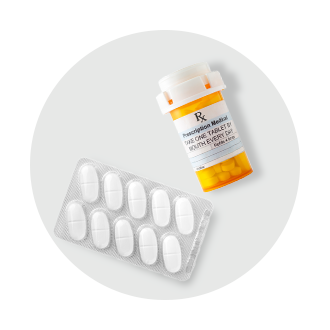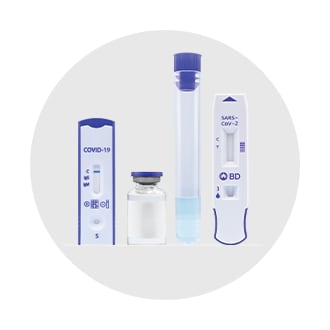*Services and availability vary by location. Age and other restrictions may apply. For coverage, consult your health insurance company. Walk-ins welcome as time allows.
The Flu & COVID-19
The Importance of Vaccination
Because of the COVID-19 pandemic, reducing the spread of respiratory illnesses is more important than ever. Receiving the flu and COVID-19 vaccines is an essential step to protect vulnerable populations, such as the elderly, the immunocompromised and those too young to get the COVID-19 vaccine.Symptoms
Some flu and COVID-19 symptoms are similar, so it may be hard to diagnose an illness based on symptoms alone. Both diseases have symptoms including fever, chills, cough, sore throat, nasal congestion, muscle aches, headaches and fatigue.**Disease Incidence
The Centers for Disease Control (CDC) estimate that influenza has resulted in 9-45 million illnesses and 12,000-61,000 deaths annually since 2010. The World Health Organization (WHO) reports over 163 million confirmed coronavirus cases and more than 3 million deaths as of May 2021.**Information provided by the CDC. Symptoms may vary from person to person.
Frequently Asked Questions (FAQs)
Influenza, better known simply as the flu, is a contagious respiratory illness caused by viruses that infect the nose, throat and sometimes the lungs. It can cause mild to severe illness and, at times, can even lead to death. The best way to prevent the flu is by getting a flu vaccine each year.
Older people, young children and people with certain health conditions are at higher risk for serious flu complications. If you do get the flu, being vaccinated may help reduce the severity of symptoms and risk for complications. This flu season, it is more important than ever to get a flu vaccine. The flu vaccine will not protect against COVID-19, but it will reduce the risk of flu illness, hospitalization and death, thereby helping conserve potentially scarce healthcare resources.
People age 6 months and older are eligible to receive an annual seasonal flu vaccine, with rare exceptions that include those with allergies. Talk to your licensed healthcare provider to learn which type of flu vaccine is right for you.
Getting the seasonal flu vaccine annually (once a year) is the best way to reduce your risk of catching the seasonal flu and spreading it to others. September and October are ideal months to get your flu shot.
The CDC recommends injectable influenza vaccines. There is no preference for one flu vaccine over another as long as the vaccine is licensed and age appropriate.
No. The flu shot contains inactivated virus, so you cannot get the flu from the vaccine.
Yes, the COVID-19 vaccine and other vaccines like influenza may be administered on the same day and at any interval without respect to timing.
For the 2024-2025 season, all flu vaccines in the United States will be trivalent flu vaccines. The trivalent flu vaccines are designed to protect against three flu viruses: A(H1N1) virus, A(H3N2) virus, and B/Victoria virus. There are no quadrivalent vaccines available in the U.S. this season. Since B/Yamagata flu viruses have not circulated since March 2020, the protection from both the trivalent and quadrivalent flu vaccines is expected to be similar. You can learn more information about trivalent flu vaccines on the CDC’s website (Opens in a new tab or window).
Yes, co-administration of vaccines is generally safe, effective and convenient. Side effects from receiving multiple vaccines at the same time are rare and usually mild. For more information, refer to the CDC’s guidelines on receiving multiple vaccines (Opens in a new tab or window).
Kroger Health offers a wide range of health services, including vaccines, health screenings and more, tailored to meet the needs of your business, community or organization. Visit us at krogerhealth.com (Opens in a new tab or window) or e-mail the team at KHB2B@krogerhealth.com to learn more.
For more frequently asked questions and information, please visit the CDC’s flu vaccination website (Opens in a new tab or window).
Cold, Cough & Flu Medicine
Other Recommended Vaccines
COVID-19 Vaccine
Everyone aged 6 months and older is eligible for an annual COVID-19 vaccine.Shingles Vaccine
If you’re over 50, it may be time for your herpes zoster (shingles) vaccine.Pneumonia Vaccine
Protect against pneumonia with vaccines recommended for children under 5 and adults 50+.HPV Vaccine
Human Papillomavirus is a common STI that may cause various health problems, including cancer.Tools & Resources
Review our Pharmacy Notice of Nondiscrimination to learn more about how The Kroger Co.’s and its subsidiaries’ pharmacies and retail health clinics (“Kroger”) complies with applicable Federal civil rights laws.
Pharmacy, Clinic, and Nutrition services are available in select areas. Access our pharmacy locator to find a pharmacy near you. The Little Clinic practices in the following states only: AZ, KY, OH, TN, CO, IN, GA, KS, VA. Access our clinic locator to find a clinic near you. Nutrition services are not available in AK, MT, NJ, NY, SC, WY, or where otherwise prohibited by applicable law. Walk-ins welcome as time allows.






